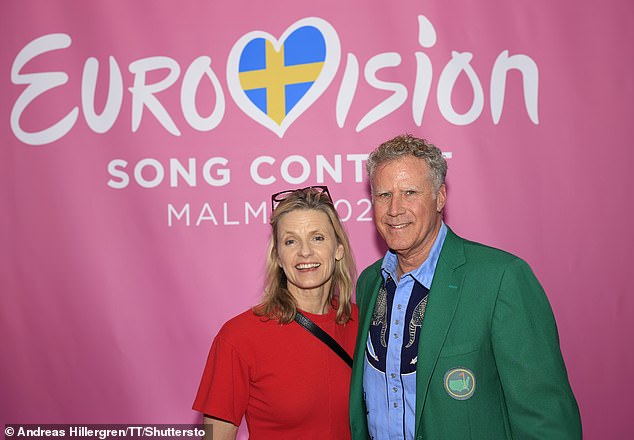The 68th edition of Eurovision was marked by chaos and political turmoil, with major crises unfolding just hours before the grand final. Despite calls for boycotts due to protests and disputes, many stars showed their support for the competition. Die-hard Eurovision fan Will Ferrell attended the event with his wife, alongside Crown Princess Victoria of Sweden. Ferrell co-wrote and starred in the Netflix film “Eurovision Song Contest: The Story of Fire Saga”, portraying an Icelandic man obsessed with Eurovision since childhood. The Princess was joined by other dignitaries at the event in Malmo, Sweden.
Despite the chaos surrounding the event, performers like Olly Alexander and Eden Golan proudly represented their countries on stage. Irish contestant Bambie Thug raised concerns after missing their final dress rehearsal, while Israel’s Golan faced significant security threats and protests. The competition faced further controversy with the withdrawal of Dutch contender Joost Klein and interruptions during performances, such as the statement made by France’s Slimane for unity and peace.
Outside the venue, protesters gathered demanding the removal of Israeli contestant Eden Golan, while Croatia emerged as the betting favorite to win the competition, with their artist Baby Lasagne leading the odds. The UK’s Olly Alexander faced criticism for his performance, with statistics suggesting he was unlikely to win. Other top contenders included Switzerland, Italy, and Ukraine. The UK’s last victory dates back to 1997 with Katrina and the Waves, and this year’s competition promised to be highly competitive.
The Eurovision Semi Final showcased a range of performances, with Ireland and Croatia standing out as early favorites to win. Ireland’s Bambie Thug impressed audiences with a unique and theatrical performance, while Croatia’s Baby Lasagna captured attention with his catchy tune. The competition saw various entries vying for a place in the final, with audiences and viewers eagerly anticipating the outcome. Despite the challenges and controversies, Eurovision continued to draw excitement and enthusiasm from fans worldwide.
As the competition drew to a close, Croatia’s Baby Lasagne emerged as the expected winner, with strong odds and a memorable performance. The UK’s Olly Alexander faced an uphill battle in the competition, while other countries such as Ireland, Switzerland, and Italy remained strong contenders. Eurovision’s legacy of showcasing diverse talents and performances continued to captivate audiences, with the competition embodying a mix of music, politics, and spectacle. Despite the turbulent year, Eurovision remained a vibrant and memorable event for fans and participants alike.


